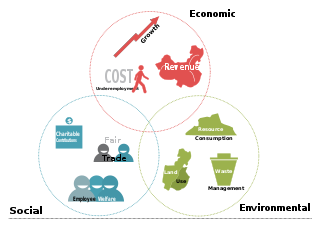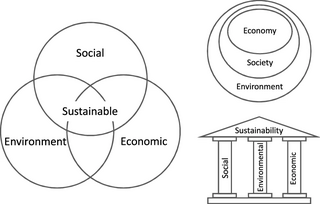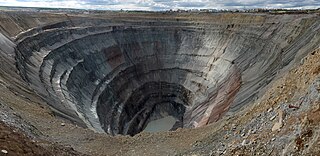
Capitalism is an economic system based on the private ownership of the means of production and their operation for profit. The defining characteristics of capitalism include private property, capital accumulation, competitive markets, price systems, recognition of property rights, self-interest, economic freedom, meritocracy, work ethic, consumer sovereignty, economic efficiency, profit motive, a financial infrastructure of money and investment that makes possible credit and debt, entrepreneurship, commodification, voluntary exchange, wage labor, production of commodities and services, and a strong emphasis on innovation and economic growth. In a market economy, decision-making and investments are determined by owners of wealth, property, or ability to maneuver capital or production ability in capital and financial markets—whereas prices and the distribution of goods and services are mainly determined by competition in goods and services markets.
Sustainable development is an approach to growth and human development that aims to meet the needs of the present without compromising the ability of future generations to meet their own needs. The aim is to have a society where living conditions and resources meet human needs without undermining planetary integrity. Sustainable development aims to balance the needs of the economy, environment, and social well-being. The Brundtland Report in 1987 helped to make the concept of sustainable development better known.
State capitalism is an economic system in which the state undertakes business and commercial economic activity and where the means of production are nationalized as state-owned enterprises. The definition can also include the state dominance of corporatized government agencies or of public companies in which the state has controlling shares.

A market economy is an economic system in which the decisions regarding investment, production, and distribution to the consumers are guided by the price signals created by the forces of supply and demand. The major characteristic of a market economy is the existence of factor markets that play a dominant role in the allocation of capital and the factors of production.

The triple bottom line is an accounting framework with three parts: social, environmental and economic. Some organizations have adopted the TBL framework to evaluate their performance in a broader perspective to create greater business value. Business writer John Elkington claims to have coined the phrase in 1994.
Eco-capitalism, also known as environmental capitalism or (sometimes) green capitalism, is the view that capital exists in nature as "natural capital" on which all wealth depends. Therefore, governments should use market-based policy-instruments to resolve environmental problems.
A green economy is an economy that aims at reducing environmental risks and ecological scarcities, and that aims for sustainable development without degrading the environment. It is closely related with ecological economics, but has a more politically applied focus. The 2011 UNEP Green Economy Report argues "that to be green, an economy must not only be efficient, but also fair. Fairness implies recognizing global and country level equity dimensions, particularly in assuring a Just Transition to an economy that is low-carbon, resource efficient, and socially inclusive."

A steady-state economy is an economy made up of a constant stock of physical wealth (capital) and a constant population size. In effect, such an economy does not grow in the course of time. The term usually refers to the national economy of a particular country, but it is also applicable to the economic system of a city, a region, or the entire world. Early in the history of economic thought, classical economist Adam Smith of the 18th century developed the concept of a stationary state of an economy: Smith believed that any national economy in the world would sooner or later settle in a final state of stationarity.
The law of the value of commodities, known simply as the law of value, is a central concept in Karl Marx's critique of political economy first expounded in his polemic The Poverty of Philosophy (1847) against Pierre-Joseph Proudhon with reference to David Ricardo's economics. Most generally, it refers to a regulative principle of the economic exchange of the products of human work, namely that the relative exchange-values of those products in trade, usually expressed by money-prices, are proportional to the average amounts of human labor-time which are currently socially necessary to produce them within the capitalist mode of production.

Criticism of capitalism is a critique of political economy that involves the rejection of, or dissatisfaction with the economic system of capitalism and its outcomes. Criticisms typically range from expressing disagreement with particular aspects or outcomes of capitalism to rejecting the principles of the capitalist system in its entirety.

Humanistic capitalism is a concept that seeks to unite humanism, specifically the safety and health needs of people and the environment, with market forces and a market-based economy. It is often seen as a middle ground between the ideas of modern capitalism and democratic socialism.
Degrowth is an academic and social movement critical of the concept of growth in gross domestic product as a measure of human and economic development. The idea of degrowth is based on ideas and research from economic anthropology, ecological economics, environmental sciences, and development studies. It argues that modern capitalism's unitary focus on growth causes widespread ecological damage and is unnecessary for the further increase of human living standards. Degrowth theory has been met with both academic acclaim and considerable criticism.

Sustainability is a social goal for people to co-exist on Earth over a long period of time. Definitions of this term are disputed and have varied with literature, context, and time. Sustainability usually has three dimensions : environmental, economic, and social. Many definitions emphasize the environmental dimension. This can include addressing key environmental problems, including climate change and biodiversity loss. The idea of sustainability can guide decisions at the global, national, organizational, and individual levels. A related concept is that of sustainable development, and the terms are often used to mean the same thing. UNESCO distinguishes the two like this: "Sustainability is often thought of as a long-term goal, while sustainable development refers to the many processes and pathways to achieve it."
Production for use is a phrase referring to the principle of economic organization and production taken as a defining criterion for a socialist economy. It is held in contrast to production for profit. This criterion is used to distinguish communism from capitalism, and is one of the fundamental defining characteristics of communism.
Throughout modern history, a variety of perspectives on capitalism have evolved based on different schools of thought.
The commodification of nature is an area of research within critical environmental studies that is concerned with the ways in which natural entities and processes are made exchangeable through the market, and the implications thereof.

Corporate environmental responsibility (CER) refers to a company's duties to abstain from damaging natural environments. The term derives from corporate social responsibility (CSR).

Extractivism is the removal of natural resources particularly for export with minimal processing. This economic model is common throughout the Global South and the Arctic region, but also happens in some sacrifice zones in the Global North in European extractivism. The concept was coined in Portuguese as "extractivismo" in 1996 to describe the for-profit exploitation of forest resources in Brazil.
Progressive capitalism is an economic framework that seeks to recalibrate the roles of the market, state, and civil society to enhance societal well-being. This approach advocates for a new social contract that leverages market forces and entrepreneurship while addressing issues such as market dominance, inequality, and the consequences of globalization. Progressive capitalism emphasizes the need for government investment in technology, education, healthcare, and green infrastructure, alongside implementing public options for essential services.

Environmentalism in China consists of philosophical concepts and the movement within China with the goals of preserving its environment and addressing environmental issues.









